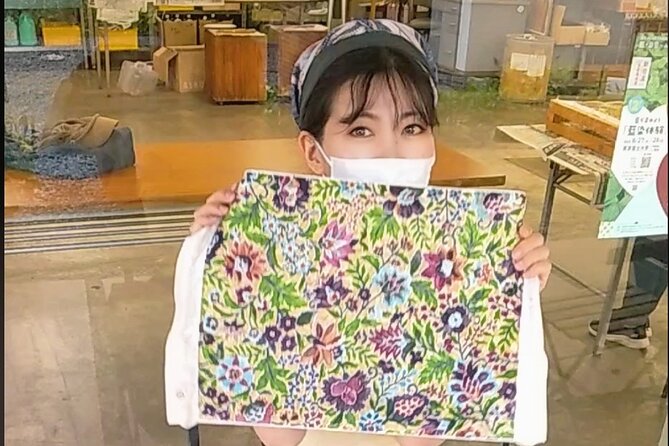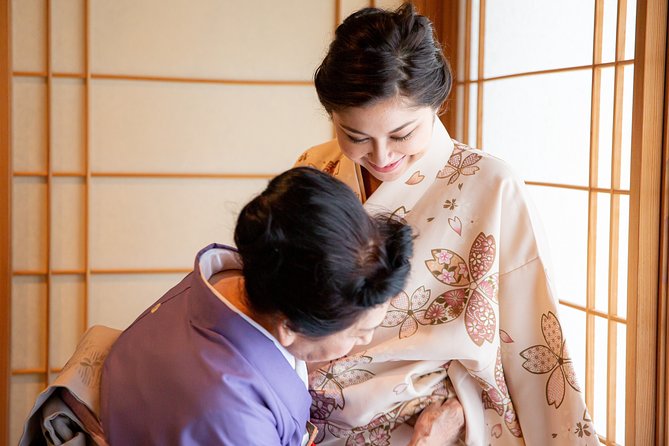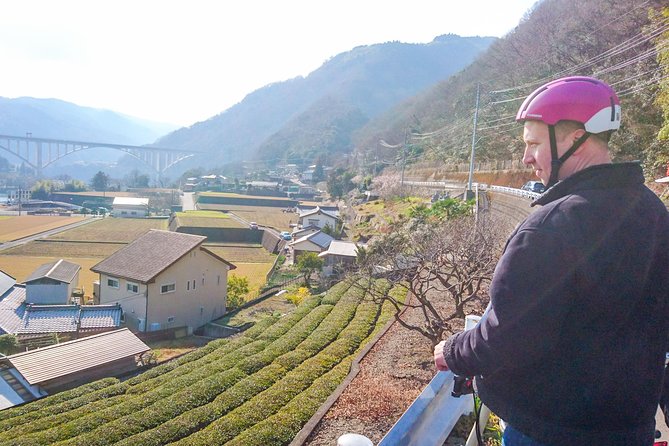The Tsumami-Zaiku Fabric Craft Activity offers a doorway into the world of traditional Japanese artistry. By using the symbolic technique of fabric folding, participants can enjoy the mesmerizing process of Tsumami-Zaiku.
This hands-on activity provides all the necessary tools and even includes a takeaway bag for participants to bring their creations home. The meeting point at Shinjuku Station in Tokyo ensures convenience, with the venue just a short walk away.
All fees and taxes are covered, and service animals are welcome. For those needing assistance, it is recommended to bring glasses or a magnifying glass.
With confirmation upon booking and clear participation guidelines, this activity promises an informative and engaging experience for all.
Quick Takeaways
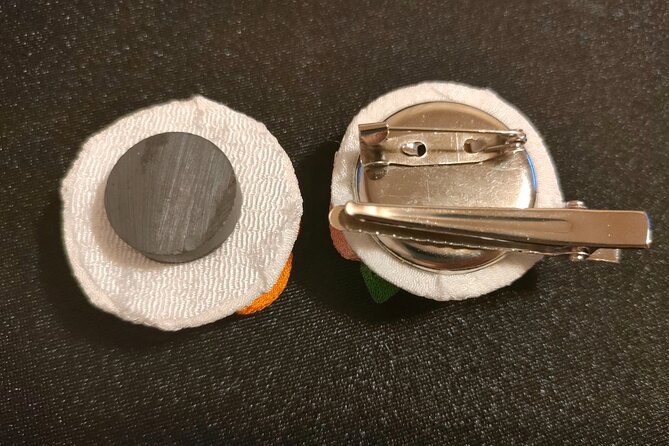
- Tsumami-Zaiku originated in the Edo period of Japan and involves folding and pinching small squares of silk fabric.
- It was initially used for traditional hairstyles but has evolved into a popular decorative art form.
- The craft requires precision and attention to detail.
- The activity includes all necessary tools, a takeaway bag, covered fees and taxes, and easy transportation of completed craft pieces.
Background of Tsumami-Zaiku Fabric Craft
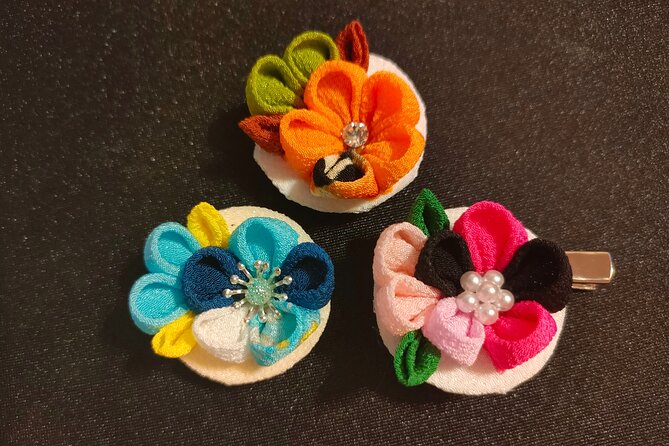
The background of Tsumami-Zaiku Fabric Craft can be explored by understanding its historical and cultural significance in Japanese art and craft traditions.
Tsumami-Zaiku, which translates to ‘pinching craft,’ originated in the Edo period of Japan, around the 17th century. It’s a traditional technique of folding and pinching small squares of silk fabric to create intricate three-dimensional designs.
The craft was initially used to adorn traditional hairstyles, such as the geisha’s ornate hairpins. Over time, Tsumami-Zaiku evolved into a popular decorative art form, with practitioners creating various accessories like brooches, earrings, and decorative pieces for clothing and home decor.
The techniques involved in Tsumami-Zaiku require precision and attention to detail, as well as a deep understanding of traditional Japanese aesthetics.
Today, Tsumami-Zaiku continues to be cherished as a unique and beautiful expression of Japanese craftsmanship.
Meeting and Pickup Details
Meeting and pickup details for the Tsumami-Zaiku Fabric Craft activity include meeting at Shinjuku Station and moving to the venue together from the designated meeting point, which is a 5-minute walk away. Participants will receive detailed information about the meeting place and landmarks via message the day before the activity. The meeting location at Shinjuku Station is easily accessible and conveniently located near public transportation. To provide a visual representation of the meeting and pickup details, the following table illustrates the key information:
| Meeting Location | Transportation Details |
|---|---|
| Shinjuku Station | 5-minute walk to the venue |
| 3-chōme-38-1 Shinjuku, | |
| Shinjuku City, | |
| Tokyo 160-0022, Japan |
Participants are advised to arrive at the designated meeting point on time to ensure a smooth start to the Tsumami-Zaiku Fabric Craft activity.
Inclusions and Services Provided

Included in the Tsumami-Zaiku Fabric Craft Activity are all necessary tools, a takeaway bag, and services such as covered fees and taxes. This ensures that participants have everything they need to fully enjoy the activity and take their creations home with them.
The benefits and advantages of these inclusions are:
- Convenience: By providing all the necessary tools, participants don’t have to worry about bringing their own or purchasing them separately. This saves time and effort.
- Cost savings: The covered fees and taxes mean that participants don’t have to worry about any additional expenses. They can fully focus on the craft activity without any financial burdens.
- Ease of transportation: The takeaway bag allows participants to easily carry their completed craft pieces. They can safely transport them without any damage or inconvenience.
Participant requirements and restrictions include:
- Maximum of 4 travelers per tour/activity: This ensures a small group size for a more personalized experience.
- Children under 8 can participate if they can sit quietly: This requirement ensures a peaceful and enjoyable experience for all participants.
- Service animals allowed: Participants with service animals are accommodated, ensuring accessibility for everyone.
Additional Information for Participants
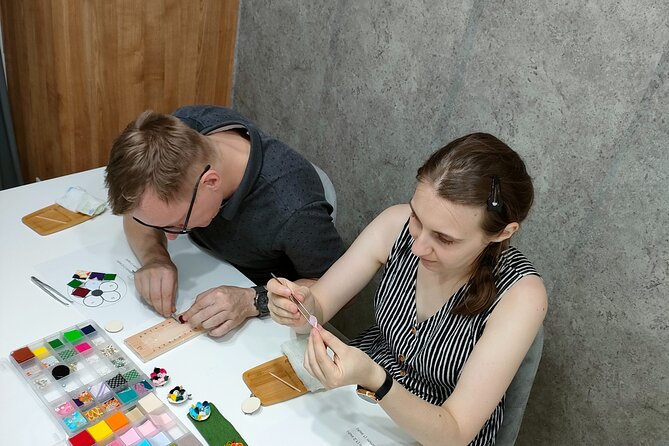
Participants should take note of some additional information for the Tsumami-Zaiku Fabric Craft Activity.
It’s recommended to bring glasses or a magnifying glass if needed, as intricate details may require closer inspection.
Plus, it’s important to be aware that there’s a maximum of four travelers per activity. This ensures a more personalized and intimate experience for participants, allowing for individual attention and guidance from the instructor.
By limiting the number of participants, everyone can fully engage in the craft activity and receive the necessary support. It’s essential to adhere to this maximum limit to maintain the quality of the experience.
Therefore, participants should plan accordingly and make reservations in advance to secure their spot in the Tsumami-Zaiku Fabric Craft Activity.
What to Expect During the Activity

During the Tsumami-Zaiku Fabric Craft Activity, participants can anticipate a hands-on experience in creating intricate fabric crafts using traditional Japanese techniques. Here is what they can expect during the activity:
-
Introduction to Tsumami-Zaiku:
Participants will receive an overview of the history and significance of Tsumami-Zaiku, a traditional craft that involves folding and shaping small squares of fabric to create intricate designs. -
Guided Instruction:
An experienced instructor will guide participants through the step-by-step process of creating their own Tsumami-Zaiku crafts. They’ll learn various folding techniques and how to assemble the fabric pieces to create beautiful patterns and shapes. -
Personalized Creations:
Participants will have the opportunity to unleash their creativity and personalize their crafts by choosing different fabrics, colors, and patterns. They’ll leave the activity with a unique Tsumami-Zaiku creation that they can cherish as a memento of their experience.
Directions to the Venue

The venue for the Tsumami-Zaiku Fabric Craft Activity can be easily reached from the designated meeting point at Shinjuku Station in Tokyo, Japan. From the meeting point, it takes approximately 5 minutes on foot to reach the venue. Detailed directions and landmarks will be messaged to participants the day before the activity.
In terms of transportation options, Shinjuku Station is a major transportation hub in Tokyo, making it convenient for participants to access the venue. Public transportation is readily available near the venue, allowing for easy travel to and from the activity. Participants are advised to check the local transportation schedules and plan their journey accordingly.
Important Reminders and Policies

Upon arrival at the venue for the Tsumami-Zaiku Fabric Craft Activity, it’s important to be aware of the following reminders and policies:
- Cancellation policy: It’s crucial to note that a full refund will only be given if the activity is canceled 24 hours in advance. Any changes made less than 24 hours before the start time won’t be accepted.
- Required tools: Participants are advised to bring their own glasses or a magnifying glass if needed. Although all necessary tools will be provided, having personal tools can enhance the crafting experience.
- Maximum number of participants: The activity allows a maximum of 4 travelers per tour. This limitation ensures a more personalized and focused experience for each participant.
It is essential to familiarize oneself with these reminders and policies to have a smooth and enjoyable experience during the Tsumami-Zaiku Fabric Craft Activity.
Frequently Asked Questions
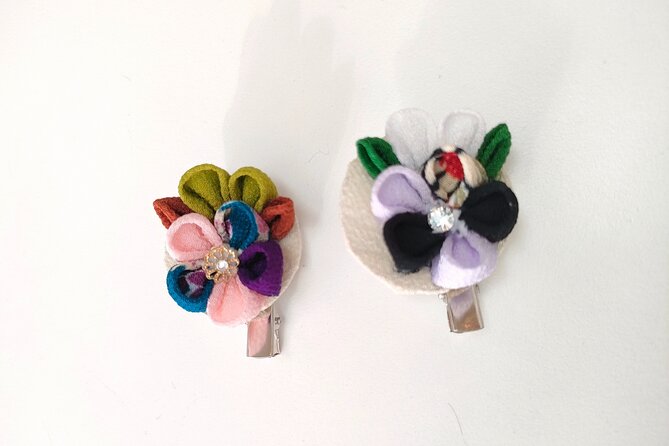
Are There Any Age Restrictions for Participating in the Tsumami-Zaiku Fabric Craft Activity?
There are no age restrictions for participating in the Tsumami-Zaiku fabric craft activity. The activity is designed to be suitable for all ages and skill levels, allowing everyone to enjoy and learn the craft.
Is Prior Crafting Experience Required to Participate in the Activity?
Crafting experience is not required to participate in the activity. Participants of all skill levels can join in and learn the art of Tsumami-Zaiku fabric craft. The activity is designed to be accessible to everyone.
Can I Bring My Own Fabric Materials or Do I Need to Use the Ones Provided?
Participants are encouraged to bring their own fabric materials if they prefer, but the necessary materials for the Tsumami-Zaiku Fabric Craft Activity will be provided.
Are There Any Specific Designs or Patterns That We Will Be Making During the Activity?
During the Tsumami-Zaiku Fabric Craft Activity, you will create specific designs and patterns using the provided materials. The craft activity allows for individual creativity and the opportunity to learn traditional Japanese fabric folding techniques.
Is There a Dress Code or Any Specific Clothing Requirements for the Activity?
There is no specific dress code or clothing requirements for the activity. Participants are advised to wear comfortable clothing and shoes as they will be engaging in a fabric craft activity.
The Sum Up
To sum it up, the Tsumami-Zaiku Fabric Craft Activity offers a unique and engaging experience for craft enthusiasts. With all necessary tools provided and a convenient meeting point at Shinjuku Station in Tokyo, participants can easily learn the traditional Japanese fabric folding technique.
The activity includes all fees and taxes, allows service animals, and provides additional information for participants such as recommended items to bring.
This activity promises a hassle-free and informative experience for all.



